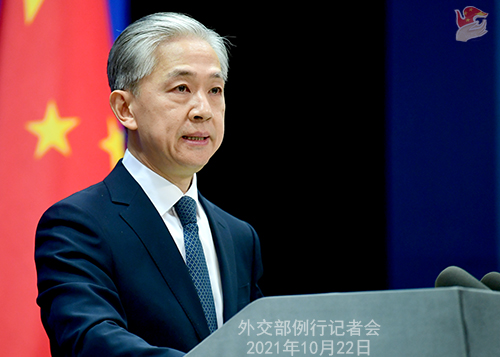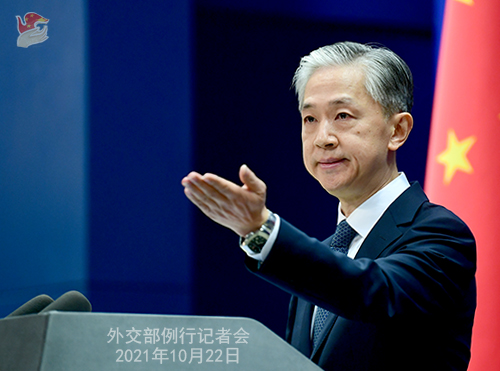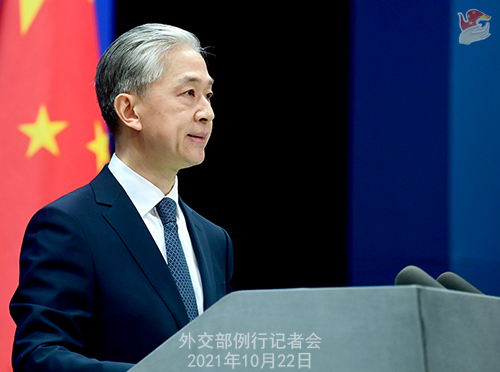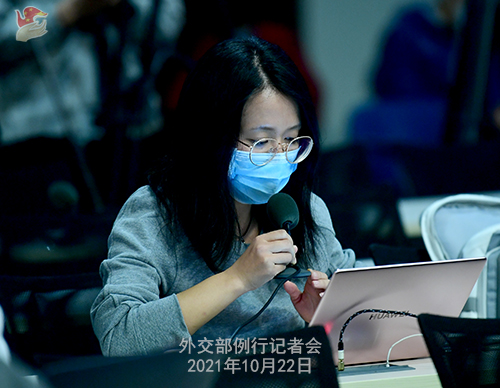
Reuters: US leader said when asked if the US would come to the defense of Taiwan that the US has a commitment to do so. The White House later said there is no change in US policy on Taiwan. Do you have any comment?
Wang Wenbin: Taiwan is an inalienable part of China's territory. The Taiwan question is purely China's internal affairs that allow no foreign interference. On issues that bear on China's sovereignty, territorial integrity and other core interests, no one shall expect China to make any compromise or trade-offs. No one should underestimate the resolve, the will and the ability of the Chinese people to defend their national sovereignty and territorial integrity. Do not stand on the opposite side of the 1.4 billion people. We urge the US to earnestly abide by the one-China principle and stipulations in the three China-US joint communiques, be prudent with its words and actions on the Taiwan question, and avoid sending wrong signals to the "Taiwan independence" separatist forces, lest it should seriously damage China-US relations and peace and stability across the Taiwan Strait.
Xinhua News Agency: Would you share more information on the Conference Marking the 50th Anniversary of the Restoration of the Lawful Seat of the PRC in the UN?
Wang Wenbin: This year marks the 50th anniversary of the restoration of the lawful seat of the China in the UN. Over the past 50 years, China has been upholding the banner of multilateralism, firmly defending the UN-centered international system, the international order underpinned by international law, and the central role of the UN in international affairs. For 50 years, China has deeply engaged in the cause of the UN, safeguarded world peace, promoted common development and continuously expanded cooperation with the UN.
With a view to reviewing the glorious journey of China has travelled with the UN, taking stock of valuable experiences of China's participation in global governance reform and development, and starting a new course of cooperation between China and the UN, China will host the Conference Marking the 50th Anniversary of the Restoration of the Lawful Seat of the PRC in the UN in Beijing on October 25, and President Xi Jinping will attend and deliver important remarks at the conference. Representatives from relevant sectors in China, UN Secretary-General Antonio Guterres, diplomatic envoys and representatives of international organizations in China will physically and virtually attend the meeting upon invitation.
TASS: Russian President Vladimir Putin said yesterday that "unlike NATO countries, we are not creating any closed military alliance or any military bloc between Russia and China. There are no grounds for such a conversation". Do you have any comments on this?
Wang Wenbin: We highly appreciate President Putin's positive remarks on China-Russia relations at the plenary session of the annual meeting of the Valdai International Discussion Club. This year marks the 20th anniversary of the Treaty of Good-neighborliness and Friendly Cooperation between China and Russia. During the past two decades, the two sides, under the leadership of our heads of state, have always worked to develop long-term good-neighborliness and mutually-beneficial cooperative relationship on the basis of non-alliance, non-confrontation and non-targeting of third countries. Our two countries have always been advocates of world peace, contributors to global development and defenders of international order, setting an example for a new type of international relations. China and Russia are not allies but closer than allies.
The world belongs to people in all countries. The difficulties and challenges facing the world need to be addressed by all together. It is the overriding trend and people's aspiration to have openness rather than isolation, cooperation rather than confrontation, win-win results rather than zero-sum games. China stands ready to join hands with Russia and the rest of the international community to practice the philosophy of win-win cooperation, foster a new type of international relations featuring mutual respect, equity, justice and win-win cooperation, advance the building of a community with a shared future for mankind, and compose a new chapter of international relations for the 21st century.

China News Service: We noted that the Ministry of Foreign Affairs released a position paper on China-UN cooperation today. Could you provide more information?
Wang Wenbin: This year marks the 50th anniversary of the restoration of the lawful seat of the PRC in the UN. Over the past 50 years, China has always upheld multilateralism and insisted that international affairs should be handled with the consultation of all stakeholders and that the future of the world should be decided jointly by all countries. We've always firmly rejected unilateralism, protectionism and bullying practices as well as pseudo-multilateralism in all its manifestations. We've always worked actively for reform and improvement of the global governance system to make it more just and equitable. We've always made development a top priority, stayed committed to a people-centered development philosophy, and endeavored to build a global community of development with a shared future.
The world is undergoing profound changes, with the world economy experiencing an arduous recovery due to incessant waves of COVID-19 outbreaks. In the meantime, peace and development remain the trend of our times. There is an overwhelming call in the international community to uphold multilateralism, strengthen solidarity and cooperation and jointly meet challenges. The position paper on China-UN cooperation exemplifies China's outstanding contribution to UN's work in various fields in the past 50 years. It also sets forth China's positions and propositions on important international issues such as upholding multilateralism, promoting global development and rallying against the epidemic.
Looking ahead, China is ready to work with other countries to build the UN into a core platform for all countries to jointly safeguard security for all, share development achievements and decide on the future of the world. China will continue to practice true multilateralism, be an advocate of world peace, a contributor to global development, a defender of international order, and a provider of public goods. We will shoulder our responsibility to safeguard the common interests of human development and progress, and make unremitting efforts to build a community with a shared future for mankind.
CCTV: On October 21, the first foreign ministers' meeting of China and Pacific Island Countries was held via video link. Can you share more on the outcomes and what's your comment on cooperation between China and Pacific Island Countries?
Wang Wenbin: Yesterday, the first foreign ministers' meeting of China and Pacific Island Countries was held via video link and was chaired by State Councilor and Foreign Minister Wang Yi. President and Foreign Minister Taneti Maamau of Kiribati, Prime Minister and Foreign Minister Josaia Voreqe Bainimarama of Fiji, Prime Minister Pohiva Tu'i'onetoa of Tonga, Premier and Foreign Minister Dalton Tagelagi of Niue, Minister for Foreign Affairs and International Trade Soroi Eoe of Papua New Guinea, Minister of Foreign Affairs, International Cooperation and External Trade Marc Ati of Vanuatu, Secretary of Foreign Affairs Kandhi Elieisar of Federated States of Micronesia and Minister of Foreign Affairs and External Trade Jeremiah Manele of Solomon Islands, representative of Samoa's Prime Minister and Foreign Minister Strickland and Secretary General of the Pacific Islands Forum Henry Puna attended the meeting.
State Councilor and Foreign Minister Wang Yi pointed out that the deepening relationship between China and Pacific Island Countries is enabled by mutual respect and equal treatment, the joint fight against challenges, win-win cooperation and common development as well as mutual understanding and mutual learning. The relations have set an example of friendly exchanges, solidarity and cooperation for countries in different regions, of different sizes and with different systems. Representatives of the Pacific Island Countries at the meeting thanked China for its selfless help and support for the development of Pacific Island Countries for a long time. They expressed their support for the Global Development Initiative put forward by President Xi Jinping, and their hope for strengthening exchanges on governance with China, deepening Belt and Road cooperation, enhancing solidarity in fighting COVID-19, and stepping up communication and coordination on multilateralism, climate change and other global issues, so as to jointly defend common interests of developing countries.
Six-point consensus was reached at the meeting. First, we need to enhance mutual trust and continue to understand and support one another on the issues concerning each other's core interests. Second, we need to continue enhancing anti-pandemic cooperation, ensuring people's health and safety, and achieving complete victory over the pandemic together. Third, we need to support the Global Development Initiative, advance high-quality Belt and Road cooperation, and promote shared development and revitalization. Fourth, we need to work together to tackle global challenges, and expand and deepen cooperation on climate change, marine environment protection and other issues. Fifth, we need to uphold and practice multilateralism, and safeguard the international system with the UN at its core and the international order based on international law. Sixth, we need to establish a regular meeting mechanism of China-Pacific Island Countries foreign ministers and promote the long-term and steady operation of the mechanism.
Concrete outcomes were achieved at the meeting, which include the establishment of a China-Pacific Island Countries reserve of emergency supplies, a poverty reduction and development cooperation center, and climate action cooperation center as well as the convening of a China-Pacific Island Countries fisheries cooperation and development forum. The meeting also put forth and focused on the discharge of the nuclear contaminated water, and reiterated the commitment to maintaining the international non-proliferation system and the South Pacific Nuclear-Free Zone. After the meeting, the Joint Statement of China-Pacific Island Countries Foreign Ministers' Meeting was published.
Looking ahead, China is ready to continue close communication with Pacific Island Countries, cooperate in good faith, and jointly build a closer comprehensive strategic partnership to deliver more benefits to the people and create new highlights in regional cooperation.

Bloomberg: The US is aiming for a video conference between President Joe Biden and President Xi Jinping in November, according to reports. Can you give an update on that?
Wang Wenbin: My colleague has answered relevant questions. I have no further information to offer.
Associated Press of Pakistan: On October 20, a spokesperson of the NDRC said that China-Pakistan Economic Corridor has made a significant progress as highways, technical training schools and power plants funded by China have been put into operation in Pakistan. Do you have any comment on it?
Wang Wenbin: As you said, the press conference of the NDRC the other day shared the latest progress of CPEC. We are happy about what has been achieved. This is a reflection of China-Pakistan friendship and a vivid example of how Belt and Road promotes development and prosperity of countries concerned. China is ready to jointly implement the important consensus of leaders of the two countries, build CPEC into a model program of high-quality development under the Belt and Road Initiative, and contribute to building a closer China-Pakistan community with a shared future in the new era.
CCTV: Arab states envoys just wrapped up an exchange tour to Qinghai. Do you have more on the visit?
Wang Wenbin: From October 16 to 19, the Ministry of Foreign Affairs organized an exchange tour for diplomatic envoys of Arab states to the beautiful province of Qinghai. Ambassadors, charge d'affaires and diplomats from 17 Arab states and the League of Arab States joined the trip. In Xunhua Salar Autonomous County, the delegation was invited to the homes of Muslim villagers for a chat and visited Ethnic Unity Exhibition Hall, Folk Culture Park, and Islamic Institute, seeing with their own eyes the harmonious coexistence of different ethnic groups, rural vitalization and development, and the fully protected freedom of religious belief in Qinghai. They learned in detail about the ecological and environmental protection in Qinghai and saw the achievements in ecological conservation and green development. They also learned through on-site visits about the inheritance and protection of the intangible cultural heritage Tibetan carpet.
Second-hand knowledge is often not enough to convince people. Through the field trips, the envoys got a first-hand experience of the tremendous efforts Qinghai has made as well as the fruitful outcomes thus achieved in promoting green, innovative and livelihood-oriented development, enhancing ethnic solidarity and protecting the ecological environment. They all spoke highly of this, saying that many Arab states could emulate Qinghai's development experience and they look forward to strengthening exchange and mutual-learning and expanding practical cooperation with Qinghai. The delegation also commended China's ethnic and religious policies after having in-depth exchange with Muslim residents in Qinghai and noting their happy life of abundance and freedom of religious belief. In the future, the Ministry of Foreign Affairs will provide more opportunities to foreign friends, including Arab envoys, to visit more Chinese localities so that they could get a panoramic and multidimensional view of the real China.
In recent years, China-Arab relations have enjoyed robust development. Our solidarity in combating COVID-19 has been exemplary. China-Arab friendship between governments and peoples and at national and sub-national levels has been growing deeper and stronger. China stands ready to work together with Arab states to inherit and carry forward this friendship, jointly advance the BRI and deepen mutually-beneficial cooperation to deliver more benefits to the people.
CRI: It is reported that 14 people died and many injured in Syria after a terrorist bomb attack of an army bus in Damascus on October 20 local time. Do you have any comment?
Wang Wenbin: The Chinese side strongly condemns this terrorist attack in Damascus. We mourn for the victims and express sympathy to the bereaved families and the injured. China opposes all forms of terrorism and support the Syrian government's counter-terrorism efforts. We will continue to work with the international community for an early restoration of peace, stability and lasting security.

Anadolu Agency: Yesterday during the UN Third Committee meeting in New York, some Western countries said that there is oppression against and violation of human rights of Uyghurs and other ethnic minorities in Xinjiang. Do you have a comment on that?
Wang Wenbin: Let me brief you on the meeting. On October 21, Cuba delivered a joint statement on behalf of 62 countries at the Third Committee of the 76th Session of United Nations General Assembly, stressing that issues related to Hong Kong, Xinjiang and Tibet are China's internal affairs that brook no interference by any external forces and expressing support for China's implementation of One Country, Two Systems in the Hong Kong Special Administrative Region. The joint statement emphasizes that the 62 countries oppose politicization of human rights and double standards, unfounded allegations against China out of political motivation and based on disinformation, and interference in China's internal affairs under the pretext of human rights. Besides, more than 30 countries voiced their support for China in their separate statements and sending joint letters. After the 48th session of the Human Rights Council, nearly 100 countries have once again spoken up for justice at the UN, voicing their explicit support for China's legitimate position, which fully shows that justice always prevails.
A small number of Western countries, based on disinformation, rumors and lies, keep attacking and maligning China on issues relating to Xinjiang and other matters and interfering in China's domestic affairs with human rights as a disguise. China firmly rejects this. Our determination to safeguard national sovereignty, security and development interests is steadfast. Their plotting will come to nothing. We urge these countries to earnestly reflect upon their serious human rights issues at home, abide by the purposes and principles of the UN Charter and basic norms governing international relations, and contribute to the healthy development of the international human rights cause through concrete deeds.
Global Times: The US has repeatedly expressed concerns over China's development of hypersonic missile technology. However, we noticed that the US Department of Defense said in a statement yesterday that the US successfully tested hypersonic weapon component prototypes and will conduct a flight test of the hypersonic missile in fiscal year 2022, which began on October 1. Do you have any comment?
Wang Wenbin: The US is the first country in the world to conduct the research and development of hypersonic weapons. It is now still developing and even spreading hypersonic missile technology and investing trillions of dollars to upgrade its "nuclear triad" force. We have noted that the US expressed concerns over China's normal spacecraft test and play up the "China threat" theory. Can the US explain to the international community what it intends to do with its development of hypersonic weapons? And for what reason does the US worry about others? Does that mean the international community has every reason to express concerns over US moves?
We urge the US to fully respect other countries' right to develop normal defense capacity, and stop seeking military buildup by hyping up the so-called "military threat" of others.
Shenzhen TV: On October 21, the US State Department issued a statement to express the concerns over the "continued erosion" of human rights and fundamental freedoms in Hong Kong. The disqualification of some district councilors by Hong Kong authorities prevent people in Hong Kong from participating meaningfully in their own governance, the statement said. On the same day, the British Foreign Secretary said she was deeply concerned about the disqualification. Do you have any response?
Wang Wenbin: The Hong Kong SAR government disqualified relevant district councilors in accordance with the Basic Law and relevant stipulations of the SAR. The decision is legitimate, lawful and beyond reproach. Hong Kong is China's Hong Kong and its affairs are purely China's internal affairs. No foreign country has the right to make irresponsible remarks on China's internal affairs including Hong Kong affairs.
In fact, neither the US nor the UK has ever really cared about democracy and freedom in Hong Kong. During a century and a half of British colonial rule in Hong Kong, all 28 governors were appointed by the UK. There was no election or democracy in Hong Kong, and Hong Kong people never really enjoyed freedom. Since Hong Kong's return, its people have enjoyed unprecedented democratic rights and extensive freedoms. But the US and the UK scrambled to assume the role of "saviors". Instead of caring about the rights and freedoms of Hong Kong people, what they are really up to is disrupting Hong Kong's rule of law, destabilizing the SAR and stirring up trouble there.
Facts speak louder than words. Since the earnest implementation of the National Security Law in Hong Kong and the principle of "patriots governing Hong Kong", the violent and chaotic situation in Hong Kong has been completely reversed, the lawful rights and freedoms of the Hong Kong people have been better protected, and Hong Kong's unique strengths and development potential have been fully demonstrated.
China urges relevant countries and institutions to earnestly respect China's sovereignty and stop interfering in China's internal affairs including Hong Kong affairs.
Beijing Youth Daily: On October 21, China and Pacific Island countries held a foreign ministers' meeting and released a joint statement, which called on relevant country to prudently handle the discharge of nuclear contaminated water into the sea, and have full consultation with stakeholders and relevant international institutions. Can you share more information?
Wang Wenbin: Just now, I shared some information about the first China-Pacific Island Countries foreign ministers' meeting. Let me also add that the two sides exchanged views on and expressed concerns over Japan's handling of nuclear contaminated water of Fukushima. The release of the joint statement fully shows the handling is not Japan's private matter, but a major international issue that bears on public health of Pacific-rim countries and global marine environment.
The joint statement also sends a clear signal to Japan, which is China and Pacific Island Countries and other major stakeholders are highly concerned about Japan's plan to discharge Fukushima nuclear contaminated water into the sea. We hope Japan can earnestly listen to the appeals of neighboring countries and the international community, prudently address the handling of Fukushima nuclear contaminated water in an open, transparent and responsible manner and refrain from starting the discharge of nuclear contaminated water into the sea before reaching consensus with stakeholders and relevant international institutions.

Hubei Media Group: It is reported that US, British and Australian officials made remarks on the AUKUS trilateral security partnership on October 21. They said that Australia joined AUKUS only to develop its own nuclear submarine capability and it does not, and will not use nuclear weapons. They said that AUKUS did not undermine the centrality of the Association of Southeast Asian Nations (ASEAN) and it was not a threat to regional peace. Do you have any comment?
Wang Wenbin: I noted that the US, the UK and Australia had to justify themselves in the face of the suspicion and opposition of regional countries and the international community over their trilateral security partnership. However, their feeble argument cannot address the concerns of regional countries and the wider international community.
This Anglo-Saxon "clique" created by the three countries is a typical military bloc that smacks of obsolete Cold War zero-sum mentality. It is a reflection of the three countries' obsession with force, an extension of the US and the UK's nuclear deterrence policy, and a product of the US philosophy of "position of strength". The trilateral security partnership between the US, the UK and Australia is a stark reminder that the rules the three countries believe in are still the rules of the jungle where might is right.
The US and the UK export nuclear submarines to Australia out of geopolitical and economic considerations. They did so in violation of the object and purpose of the Nuclear Non-proliferation Treaty (NPT), creating risks of the proliferation of nuclear materials and technology. Their moves have a huge impact on the international nuclear non-proliferation regime. This fully shows that the three countries are typical rules-breakers.
The nuclear submarine cooperation between the US, the UK and Australia involves transferring weapons-grade uranium of over 90 percent fissile purity to Australia, which constitutes a grave nuclear proliferation risk and violates the object and purpose of the NPT. Besides, the US will also export Tomahawk cruise missiles capable of carrying nuclear warheads to Australia. The threat posed by such moves to regional peace and security is self-evident. The three countries couldn't just deny this and explain the threat away. The trilateral cooperation is also bound to undermine efforts to build a Nuclear-Weapon-Free Zone (NWFZ) in Southeast Asia. Where is their respect for ASEAN centrality?
We once again urge the three countries to redress the mistake, abandon Cold War zero-sum mentality and stop putting together small cliques. They should uphold the international nuclear non-proliferation system and safeguard regional and world peace, stability and development, rather than the opposite.
CNR: It is reported that the spokesperson of the Taiwan region's foreign affairs department said that the head of the agency Joseph Wu will visit the Czech Republic and Slovakia. Previously, China took countermeasures on Lithuania's announcement of allowing the Taiwan authorities to set up a "representative office" in the country under the name of Taiwan. Will China take countermeasures on the Czech Republic and Slovakia?
Wang Wenbin: There is but one China in the world and Taiwan is an inalienable part of China's territory. China is firmly resolved in upholding national sovereignty and territorial integrity.
We firmly oppose all forms of official interactions between the Taiwan region and countries having diplomatic ties with China. We are watching closely the visit of the relevant personnel in the Taiwan region and will take legitimate and necessary measures to firmly uphold national sovereignty and territorial integrity. No one should be under any illusion about this.

